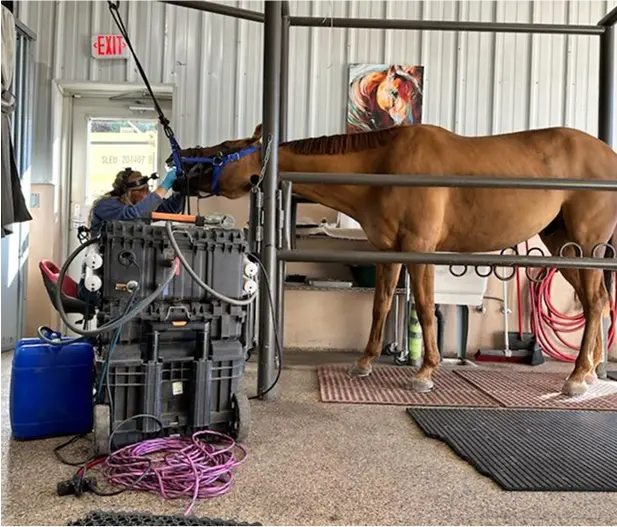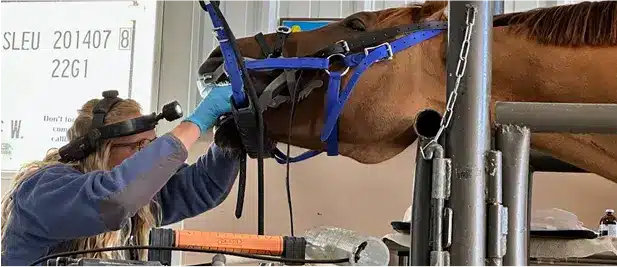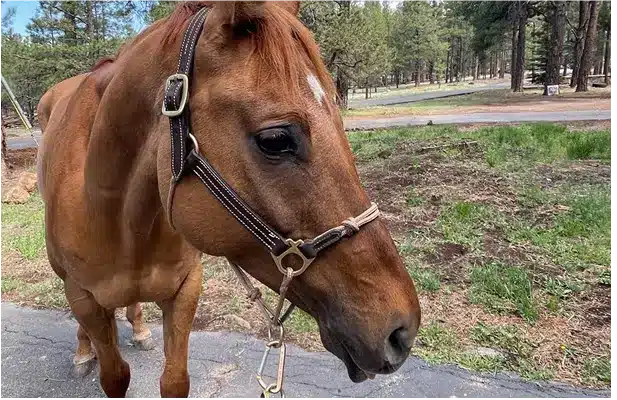Equine Dentistry in
Northern Arizona
Discover how proper horse dental care enhances your pet’s health, performance, and overall well-being.
Happy Horse, happy riders
Comprehensive Equine Dentistry Care
At Eclipse Veterinary Services, we are passionate about providing our patients with comfortable and functional mouths. Horses have complex hypsodont teeth that are constantly erupting throughout their lifetime. Horses have a set of deciduous or baby teeth, and then as those teeth are shed, they have a permanent set of teeth that erupt. Due to the complex nature of horse teeth, including donkeys, require routine horse dentistry. If you’re looking for a horse dentist near you in Flagstaff and the surrounding area, reach out today. Our vets for horses offer mobile vet care. So, yes! We come to you.
Learn more about equine dentistry and connect with our equine vet in Flagstaff, AZ—proudly serving Northern AZ—to get started.
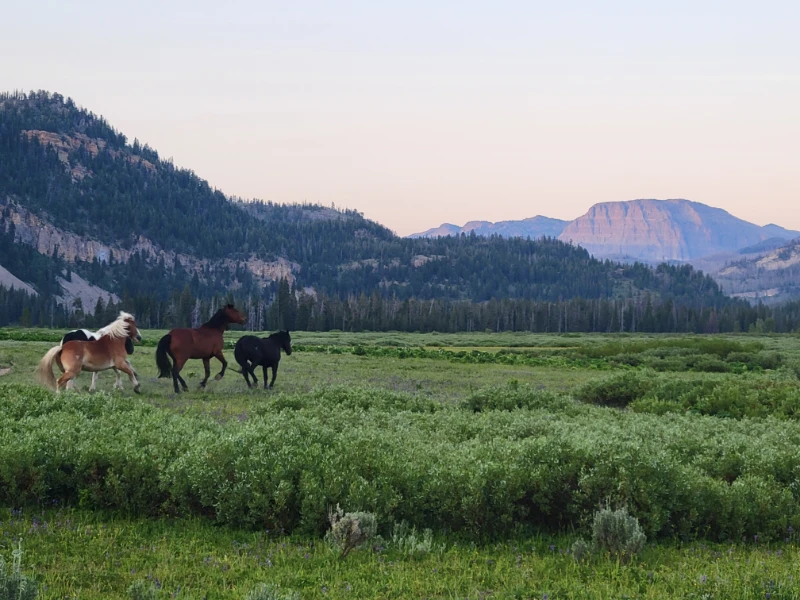
Dental care
Our Equine Dental Services
Proper dental care is crucial for the health and performance of horses. Regular dental check-ups help prevent painful conditions that can affect a horse’s ability to eat, drink, and perform. Our comprehensive equine dental services are designed to maintain optimal oral health, improve comfort, and enhance overall well-being.
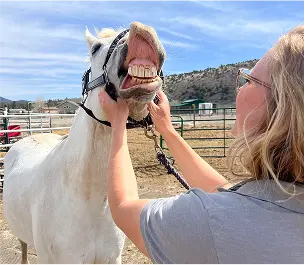
Oral Exam
The oral exam is the most important part of any dentistry work on horses. A good oral exam can not be performed without 4 things: a bright light, a speculum, a mirror and adequate sedation for the patient. It is estimated through different studies that 36-85% of horses have some type of abnormality in their mouth.
Oral exams are so important for horses of any age! In young horses we are looking for congenital malocclusions and malformed teeth, caps that are not shedding properly, wolf teeth, and sharp points that can lead to lacerations of the tongue and cheeks.
As horses age they can develop numerous conditions including gingivitis, periodontitis, caries, and wear abnormalities. They can also have fractured teeth and tooth root infections which can present with secondary sinus problems. Horses also can develop cancer in the mouth with the most common oral cancer being squamous cell carcinoma.
Periodontal disease affects between 50-75% of horses with caries affecting about 31% of horses. Yearly oral exams are so important to identify abnormalities and start to make changes to preserve the health of the horses teeth and provide comfort.
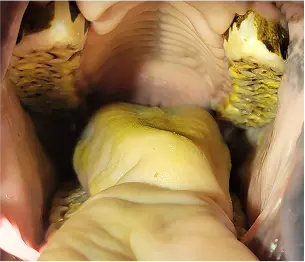
Odontoplasty
Odontoplasty is a medical term which references the contouring of the tooth surface but in the equine world we commonly use the term “floating” when referencing this procedure. Floating is a masonry term where you smooth the plaster/ concrete. Odontoplasty and floating can be used synonymously when referencing the same procedure of smoothing and leveling the teeth.
Typically, it is recommended to float teeth in horses on an annual basis. Some horses that are young, have missing teeth or malocclusions may need more frequent floating in order to keep their mouths functional.
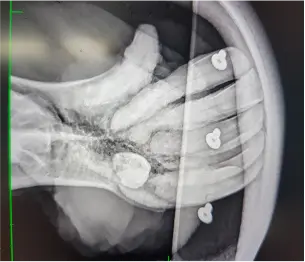
Digital Radiography
X-rays are a very important first diagnostic step to help identify abnormalities in the mouth. X-rays can assess the teeth, occlusion and also the sinuses. In order to take proper x-rays of the head of the horse, they will need to be sedated and their mouth positioned appropriately.
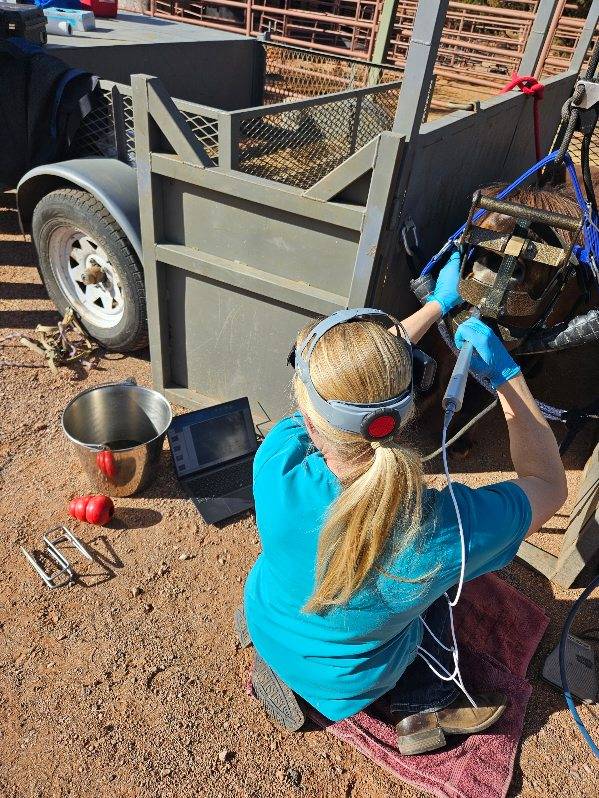
Oral Endoscopy
Oral endoscopy is a valuable diagnostic tool used to examine all the structures of the mouth. Endoscopy is great to better visualize and diagnose complicated oral lesions such as open pulps, diastemas, periodontal disease, and tooth fractures.
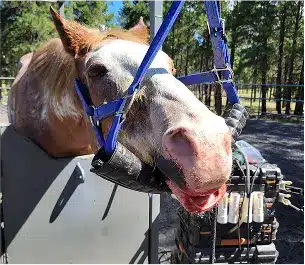
Tooth Extractions
Tooth extractions are a common dental procedure performed when a tooth is damaged beyond repair or when it causes pain, infection, or other complications.
In horses, and other animals, extracting teeth can prevent further health issues and improve overall well-being.
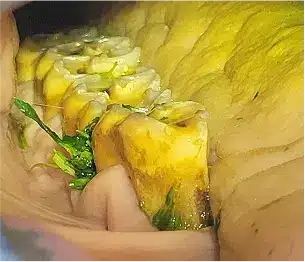
Periodontal Therapy
Periodontal therapy is essential for maintaining the overall health and comfort of your horse’s teeth and gums. Some dental conditions, particularly those involving the spaces between teeth (diastemas), can cause discomfort, pain, or even infection if left untreated.
Our specialized periodontal treatments, including diastema filling, occlusal relief cuts, and diastema widening, aim to address these issues and maintain your horse's oral health.
Understanding the 5 Part Equine Dental Exam and Treatments
Equine dental exams are essential for your horse’s health. Our thorough home vet service process ensures your horse receives the best care possible.
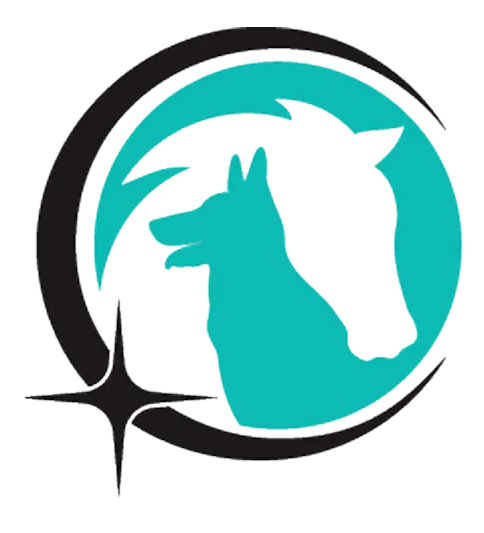
Step One: External Exam
Step Two: Check Oral Soft Tissues
Step Three: Check for Occlusion
Occlusion refers to the alignment and contact between teeth. Occlusion is essential for proper chewing and digestion, as their teeth continuously erupt and wear down over time.
Step Four: Periodontal Exam
Step Five: Endodontic exam
Donkeys Need Dental Care Too!
Donkeys wear their teeth like horses and have similar anatomy. They need routine oral exams to identify any issues of wear and malocclusion. Donkeys have an increased incidence of periodontal disease which is quite painful and can lead to loss of teeth. Donkeys can be quite stoic creatures and will not show signs of oral pain until it is too late. It is very important for donkeys to eat regularly and take in adequate calories to prevent a condition called hyperlipidemia which can lead to death. By keeping their mouths healthy and pain free we can help prevent some cases of hyperlipidemia.
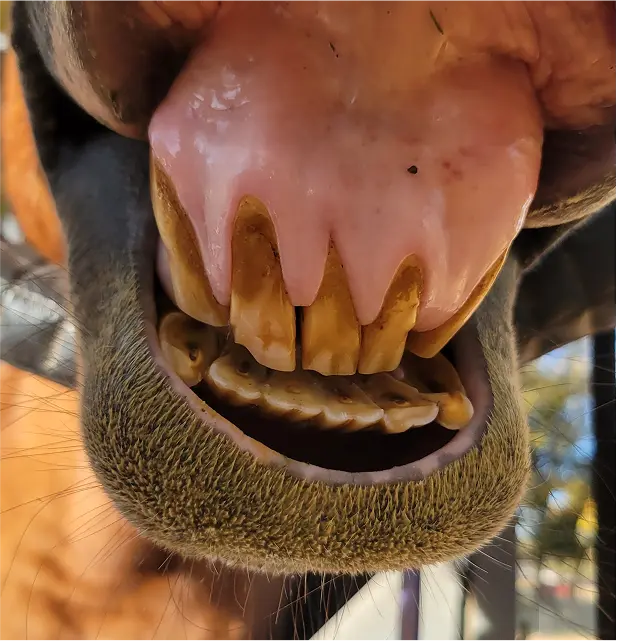
Common Equine Disease
EOTRH
Equine Odontoclastic Tooth Resorption and Hypercementosis is a painful and progressive disease of middle aged and geriatric horses. This disease mostly affects the incisor and canine teeth and the severity increases with age. Affected horses try to avoid percussion of the affected teeth due to pain so will commonly present with decreased appetite, salivating, not wanting to take the bit, not grazing properly or not wanting to bite treats/ carrots with the front incisors.
Commonly EOTRH will cause destruction of the tooth and secondary abscesses and draining tracts that can affect the surrounding bone. Radiographs are the best way to diagnose this disease and extractions of affected teeth are warranted.
Client Testimonial
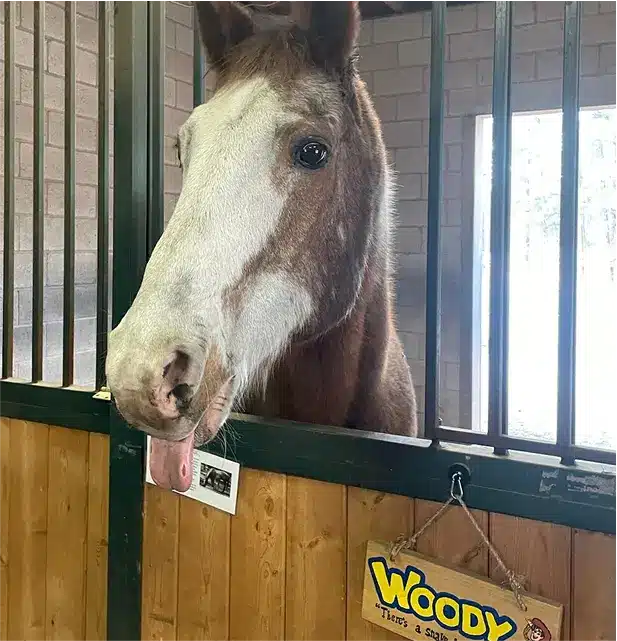
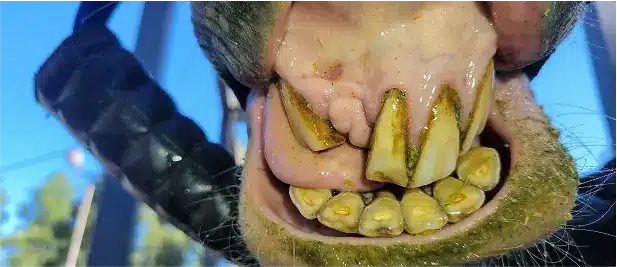
We made an appointment with Dr. Bruchman, an expert in equine dentistry. During the dental float, she noticed signs of EOTRH and we decided to take x-rays to better understand his condition. The x-rays revealed that Woody’s front teeth roots varied from large cementum bulbs to swiss cheese, with several fractured roots. Dr. B. recommended removing all his front teeth.
I was a little nervous about the procedure, but wanted to do what was best for Woody. We scheduled for a longer appointment a few weeks later. Dr. B. was fantastic in explaining the x-rays, the planned procedure, and what the aftercare would entail.
Woody’s front teeth were removed easily, all in a single appointment. He woke up from the sedation smoothly and was eager to eat his dinner that evening. Within just a few days, we noticed a positive change in his demeanor. His eyes were brighter, and his playful personality was beginning to shine through. He was no longer head-shy and began using his lips to nibble and explore his surroundings. He was also becoming more active.
Now, five months post-surgery, I am convinced that the procedure was absolutely necessary and worth it. It is evident that Woody feels better. He can still graze lightly using his lips in place of front teeth. While he can’t bite to tell younger herd mates to keep their distance, he uses his lips effectively to communicate, and it works well. Honestly, my only regret about this experience is that I didn’t have this done sooner.
-Karen (Woody’s adoring owner)
A Tail of Hidden Teeth
Pencil had been trained and used for trail riding and spent one summer on a ranch. Being that he was your typical athletic Appendix horse, his second owner took him to High School rodeos which ended up being a short-lived relationship, and he was returned after two months. Following that, he went to a professional eventing trainer for a few months, who started him in dressage. He was a quick learner and was referred to as “the Unicorn”—his only issue at the time was being somewhat difficult while bridling. At age six, Pencil found his next home with a student of the trainer, where he started in light jumping and continued trail riding. Things seemed to be going well for the first six months, except for bridling and ear sensitivity issues. Still, over time his new owner noticed that he was becoming more difficult to ride and displaying some really dangerous behaviors, particularly at the start of rides. Pencil’s owner knew that something was wrong with her normally sweet-natured gelding and started with an oral exam. Pencil had not had any dental care that she was aware of in the past year but had been checked and floated by an equine dentist earlier in his life.
A surprise was found as soon as Pencil’s mouth was opened! At first glance, he did not appear to have wolf teeth but a quick feel of his mouth told a different story. Pencil had a secret sitting under the pink gums of his mouth. Two little raised bumps in the area where the bit typically sits were felt. A few quick x-rays and two “blind” wolf teeth were found.
The first premolar, otherwise referred to as a wolf tooth, is a vestigial tooth not typically associated with chewing. The first premolar is not present in all horses and sits in an area that can interfere with a bit. Occasionally, a wolf tooth will develop in a more tipped or horizontal plane, as opposed to the normal vertical orientation within the jaw, resulting in a blind or nonerupted wolf tooth. It is estimated that blind teeth only occur in 2-3% of horses that have wolf teeth. For horses with biting problems associated with blind wolf teeth, extraction of the teeth alleviate the clinical signs.
Pencil was floated and his blind wolf teeth were extracted. His owner noticed an immediate change in his demeanor and his ear sensitivity went away. Pencil seemed much more comfortable and was now back to being his happy self, even when being ridden.
